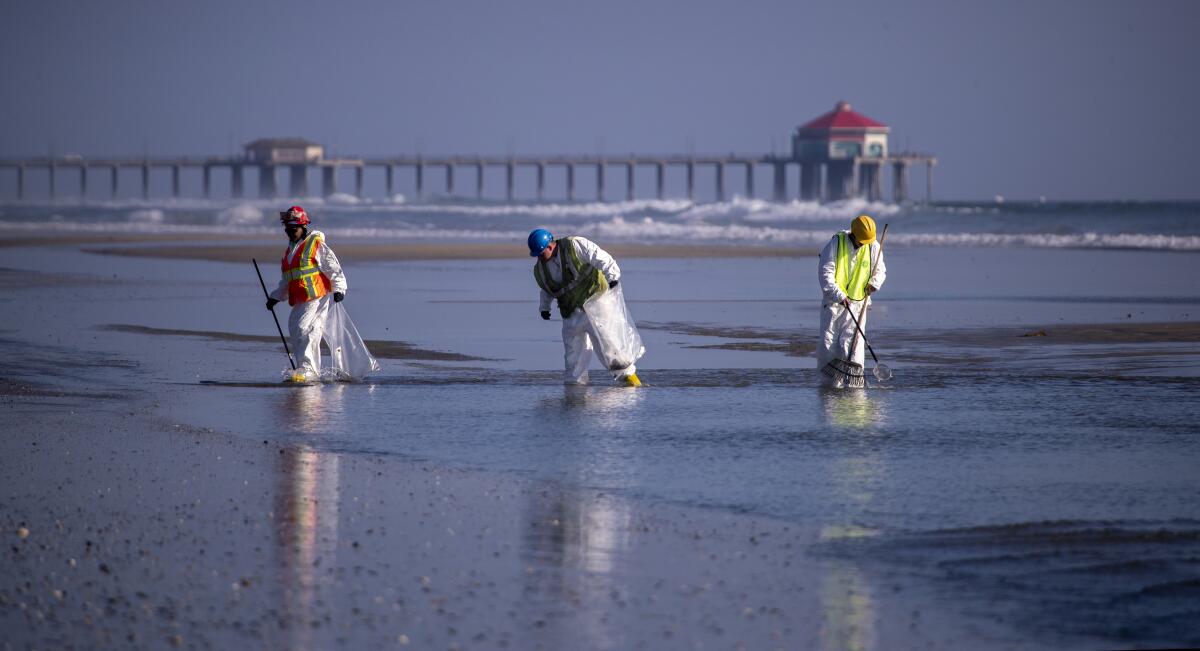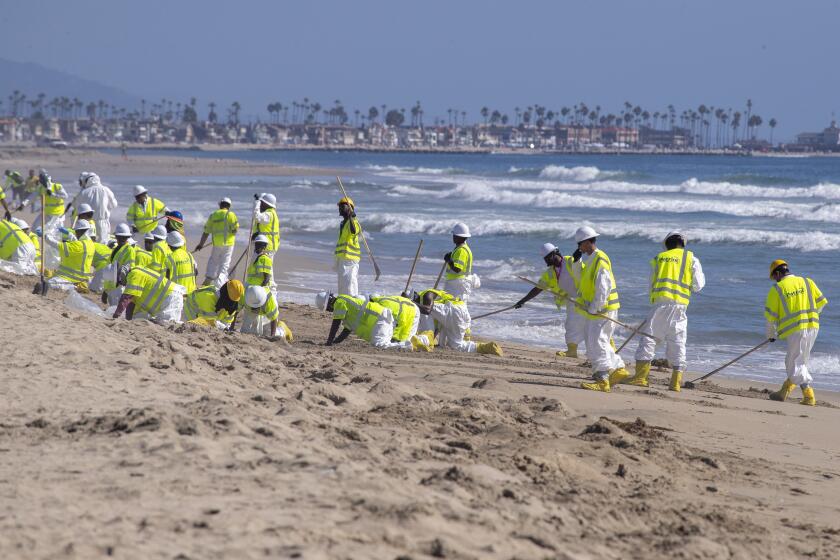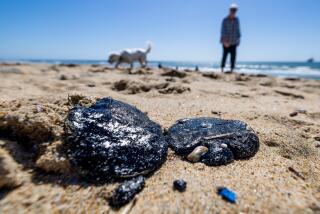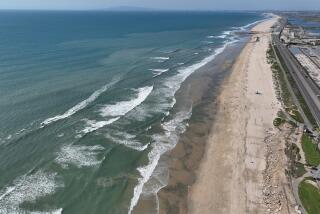Dismayed by oil spill, some in Huntington Beach say it’s time to end offshore drilling

A large yellow bulldozer pushed a mound of sand toward the mouth of the Huntington Beach Channel, creating a barrier that would hopefully slow the amount of oil that was floating up to the nearby wetlands.
Farther up, in the underpass, cleaning crews on two boats replaced the booms that had absorbed the oil.
On one end, two men placed the long, white booms on the water, tying them together. On the other end, two other men picked up the spent, blackened barriers as if they were picking up a large python and placed it in a large see-through bag.
A massive oil spill off the Orange County coast has fouled beaches and killed birds and marine life
Rolling up on his skateboard with his wife riding her bicycle behind, Sumio Uchida, 67, came to watch the aftermath of this past weekend’s massive oil spill.
He looked at the dozer and the warning signs about swimming in the ocean.
“This is sad.”
His wife Gloria Uchida nodded and added.
“Very sad.”
The couple, longtime residents of Huntington Beach, were angry. The spill has left many residents questioning the oil industry off its shore and officials calling for a ban on drilling off the coast.
“This is why offshore oil drilling needs to stop,” Sumio Uchida said. “This happened in 1990.”
Uchida was referring to Feb. 7, 1990, when the oil tanker American Trader ran over its anchor in shallow water off Huntington Beach, ripping a hole in its hull and spilling nearly 417,000 gallons of crude that fouled popular beaches along the Orange County coast. The oil killed fish and about 3,400 birds.
Uchida now was witness to another ecological disaster.
“Many of my neighbors are upset,” he said before shaking his head. “Oil companies.”
Uchida questioned how long it would take to recover from this spill. He worried not just about the wildlife that had been affected but also for his coastal town, which had already suffered economically from the pandemic and now had to deal with the oil spill.
He worried that beach events such as surfing and volleyball competitions that brought revenue to the city may not happen again. He worried the organizers would choose to go elsewhere.
Sitting on her bicycle, staring out at the crashing waves, Gloria Uchida said she too worried about that, but all anyone could do now was volunteer and help clean up.
“I may do that.”
The spill, first reported Saturday morning but perhaps detected the night before, originated from a pipeline running from the Port of Long Beach to an offshore oil platform known as Elly. The failure caused as much as 144,000 gallons of oil to gush into the Catalina Channel.
In the days that followed, the spill has left crude along stretches of sand in Newport Beach, Laguna Beach and Huntington Beach, killing fish and birds and threatening sensitive marine habitats.
“The ecological and economic damage from this oil spill has the potential to reverberate for generations,” state Sen. Dave Min (D-Irvine) said this week. At a news conference Tuesday, Min called the spill “either a case of negligence or inaction.”
“The legislation after the Santa Barbara damage [from the Refugio spill in 2015] was meant to prevent this,” he said. “It really speaks to the need to get rid of these oil rigs.”
Gov. Gavin Newsom said during a news conference at Bolsa Chica State Beach on Tuesday afternoon that it’s “time once and for all to disabuse ourselves that [oil drilling] has to be part of our future.”
“This is part of our past, and we can moralize and talk about the good old days, we can talk about how important these rigs had been to the prosperity of this country in the middle class, but at the end of the day, this is about the stale air of normalcy versus the fresh air of progress,” he said.
Times staff writer Hannah Fry contributed this is report.
More to Read
Sign up for Essential California
The most important California stories and recommendations in your inbox every morning.
You may occasionally receive promotional content from the Los Angeles Times.












